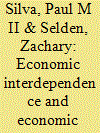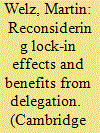| Srl | Item |
| 1 |
ID:
174078


|
|
|
|
|
| Summary/Abstract |
Economic sanctions impose costs on sender as well as target states, and those costs increase with the degree of interdependence between the states in question. We test the hypothesis that EU member states that are more economically interdependent with Russia would be the most opposed to the imposition of sanctions on Russia in response to its actions in Ukraine in 2013–2014. However, an analysis of the debate over the imposition of sanctions shows the opposite: a modest positive correlation between economic interdependence and support for the sanctions among EU member states. This finding further calls into question the fundamental linkage between economic self-interest and conflict avoidance among interdependent states.
|
|
|
|
|
|
|
|
|
|
|
|
|
|
|
|
| 2 |
ID:
174080


|
|
|
|
|
| Summary/Abstract |
The roles played by evangelical Christians in the internationalization of Sudan’s second civil war (1983–2005) illustrate the multidirectional effects of faith-based interventions into the global south. Evangelicalism is one of the most rapidly expanding contemporary religious forms in the world. The engagement of South Sudan by evangelicals of the global north has been a major moment in its formation as a unique and critical international constituency. This work unsettles deeply rooted assumptions about these types of actors, their emergent politics and their locations in global governance relations. I argue that the politics of Sudan’s civil war represents a global moment in faith-based advocacy and humanitarianism, which is deeply implicated in a globalizing and globally-engaged evangelicalism.
|
|
|
|
|
|
|
|
|
|
|
|
|
|
|
|
| 3 |
ID:
174079


|
|
|
|
|
| Summary/Abstract |
Much existing work on ideas in policymaking and lobbying has focused on how shared ideas can facilitate achievement of policy preferences. However, interviews with lobbyists and recent research indicate shared ideas may also hinder lobbying success—a topic largely ignored to date. I begin to address this gap by mapping two roles for shared ideas in lobbying processes: as icebreakers to facilitate communication with politicians and as instruments in pursuit of specific interests. I subsequently propose pathways via which shared ideas may facilitate or hinder lobbying success and illustrate these mechanisms in case studies examining British preference formation during G20 negotiations over tax reform. The analysis underlines the crucial role of strategic agency and the interaction of actor’s communication strategies when seeking to understand how ideas affect lobbying success. Likewise, it highlights the value of explicitly incorporating ideas’ multivocality into studies of ideas’ role(s) in politics.
|
|
|
|
|
|
|
|
|
|
|
|
|
|
|
|
| 4 |
ID:
174076


|
|
|
|
|
| Summary/Abstract |
Of all African regional organizations, the West African Economic and Monetary Union (WAEMU) is the one that has most explicitly followed the model of the European Union (EU), emulating key EU institutions and practices. WAEMU’s mimicry of the EU is puzzling, considering the economic, political and geographical differences between the European and the West African regional contexts. This article argues that, in order to understand WAEMU’s trajectory, it is necessary to look at two interrelated factors: on the one hand, the WAEMU's history of colonial legacies and post-colonial dependence; on the other, its drive to mimic similar institutions that are seen as embodying the standards of modernity and legitimacy. The WAEMU’s isomorphism has been an outcome of external pressures, but also a response to uncertainty and a result of professionalization. Institutional isomorphism has had a mixed impact on the effectiveness of the organization, helping it to sustain its legitimacy but also stifling endogenous development.
|
|
|
|
|
|
|
|
|
|
|
|
|
|
|
|
| 5 |
ID:
174075


|
|
|
|
|
| Summary/Abstract |
This paper explores the relations of the African Union (AU) with its member states through the lens of principal–agent theory. I consider the AU Commission—an international public administration—as an agent to which its member states—the principals—delegate authority. I show that core assumptions of principal–agent theory apply to the AU’s relations with its member states. These include that principals aim to keep control over their agent, that we find agents acting opportunistically, that principals sanction the agent if needed and that the heterogeneity of preferences amongst principals decreases the level of authority delegated to the agent. However, my analysis also suggests that principal–agent theory needs to broaden its understandings of lock-in effects and of the reasons why states limit their delegation of authority.
|
|
|
|
|
|
|
|
|
|
|
|
|
|
|
|
| 6 |
ID:
174077


|
|
|
|
|
| Summary/Abstract |
The article examines the evolution of Taiwan’s engagement in Southeast Asia since the 1990s as a unique case study in international law and international relations (IR). Under the one-China policy, the evolution of bilateral relations with Taiwan highlights the theoretical concept of recognition premised on identity and status in interstate affairs. The article argues that the states of the Association of Southeast Asian Nations (ASEAN) have established diverse forms of recognition of Taiwan in line with a policy of non-recognition. While such recognition has not amounted to recognition of statehood in international law, it demonstrates the IR concept of recognition as a gradual process in state practice. To substantiate the contention, the article examines the diplomatic privileges and immunities that ASEAN countries have accorded to Taiwan. The conclusion of bilateral trade and investment agreements has also galvanized various modes of recognizing Taiwan’s treaty-making capacity and the legitimacy of official cooperation. Hence, the findings not only enrich the study of IR, but also contribute to a broader understanding of the role of China and contemporary Asia–Pacific politics.
|
|
|
|
|
|
|
|
|
|
|
|
|
|
|
|